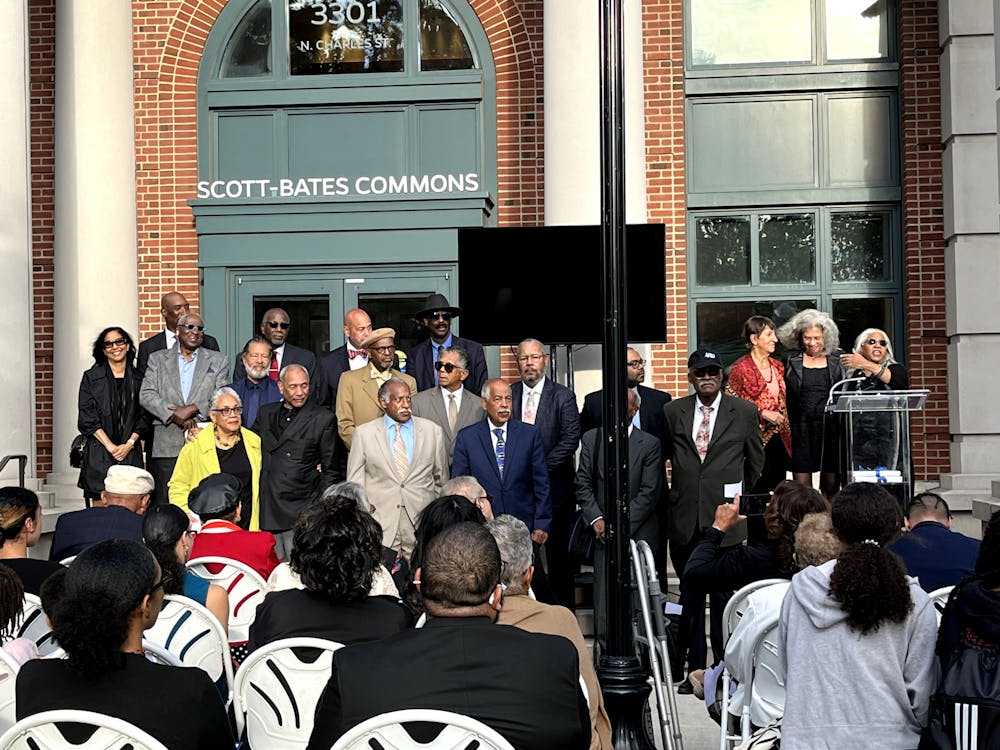The University hosted the official dedication of the Scott Tower on Sept. 24 to honor the legacy of Frederick Isadore Scott Jr., its first African American undergraduate. Coming as part of the Diverse Names and Narratives Project, which proposed the renaming of buildings after historically marginalized and underrepresented groups, the event honored Scott and his contributions as a trailblazer for diversity.
On behalf of the Diverse Names and Narratives Task Force, Katrina Caldwell, vice provost for diversity and inclusion and chief diversity officer, explained the purpose of the function in an email to The News-Letter.
“Members who serve on the task force do so since it is an opportunity to recognize remarkable individuals in the Johns Hopkins community – past and present – in a meaningful, tangible way,” she wrote. “The aim is to tell a more complete narrative of the University’s history and to make a diverse range of people, their legacies, and their impact on Hopkins visible and present across our campuses.”
Through the collective efforts of the Diverse Names and Narratives Task Force, the Hopkins Board of Trustees Office, the Office of Diversity and Inclusion, Scott's family, as well as various alumni and supporters, the function united students and faculty alike in front of the former Charles Commons to commemorate the change. Two acapella groups, Notes of Ranvier and the Melanotes, opened and closed the ceremony, respectively.
Scott applied to Hopkins in 1945 following a dare from his friends. Throughout his time as the only black student, Scott helped establish the first interracial fraternity, Beta Sigma Tau, and endured social isolation to earn a degree in Chemical Engineering.
Ronald J. Daniels, president of the University, spoke virtually at the event about Scott's impact on Hopkins outside of his academic and extracurricular participation.
“Frederick challenged and helped to change the norms that prevented so many other people of diverse backgrounds from being welcomed as equal members of the University community and supported fully by their alma mater in their journey through [Hopkins] and beyond,” he said.
Sophomore Jingxing Zou, who lives in the building, described his perspective on the Scott Tower renaming in an interview with The News-Letter.
“I was pretty interested to see who Scott and Bates were, and I looked into [the topic] further,” he said. “Renaming carries a weight because... it shows people what the University respects and is proud of.”
The University has faced criticism for a legacy of discrimination towards black residents and transgender and non-binary individuals, leading community members to demand more substantial changes to demonstrate the shift.
In an interview with The News-Letter, Jules Gill-Peterson, associate professor and general co-editor of TSQ: Transgender Studies Quarterly, spoke broadly about understanding what it means to rename a building.
“Renaming is a symbolic gesture of trying to suggest that the University is trying to break from... an institutional past that includes a lot of celebration and platforming of people who have been responsible for pretty serious harms against a wide variety of different communities,” she said.
On the other hand, she also emphasized that these symbolic gestures are just one step in contextualizing much of the University's past.
“If renaming is accompanied by broader investments, both in proactive projects... [and] meaningful material investments in things like redress, then we start to see the symbolic shift being part of something a little more meaningful,“ she said. “It's good to take a holistic look at the sum total of what the University plans to do whenever it's trying to address its own legacies.”
According to Caldwell, institutional leaders including the Board of Trusteees, president and deans are already beginning proactive efforts to recognize and elevate diverse people from the institution’s past in more tangible ways.
“As with the Frederick Scott event, we look forward to more opportunities to honor the legacies of trailblazers from our very own community,” she wrote.





